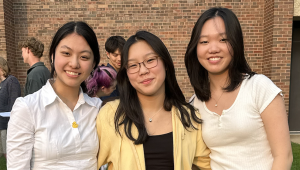Why old school rap still paves the way for social justice
December 7, 2016
My 7th grade English teacher was probably the cutest woman I’ve ever seen.
She loved to read. She always had her hair in ribbons. You would never catch her in anything but a dress. She screamed “teacher” from a mile away.
I can’t say that I remember everything I learned from that class, but the one thing that has stuck with me all these years was this woman’s love for Eminem.
It’s strange to picture at first; a bookworm English teacher fangirling over the menace that is Eminem. But it’s true. Her reasoning?
His lyrics.
She would go on about how powerful his lyrics were and the wisdom behind them.
At the time, I didn’t fully understand her.
Now with the way modern rap scene influences the music industry, I can understand what she meant perfectly.
Eminem and other rappers that emerged in previous decades are far from perfect role models, no doubt about that. But their music paved a way for voices that were once silenced.
Their lyrics (though sometimes poorly executed) carried a meaning and message that made rap what it is today.
Most modern rap and hip-hop artists can’t say the same thing.
Sometimes it seems like hip-hop artists of the 21st century can only make music that is misogynistic or carries a derogatory undertone.
People like Chief Keef, Tyga, and Fetty Wap have flooded the airwaves with lyrics that have no purpose but to reinforce their dominance and “masculinity.”
Many popular modern rap artists don’t even write their own tracks.
They’ve diluted the airwaves and given rap and hip-hop a bad name.
What was once created to share a story and provide a release from a hard life has now become a way for men to degrade women and try to make as much profit as they can in doing so.
That’s not to say that there aren’t incredible rappers that have emerged recently. Kendrick Lamar, J. Cole, and Vince Staples have carried on the rap legacy that was set for them.
They’ve done so by continuing to give voice and recognition to people all over the world who can’t express it themselves.
They share a story in a way that everyone can connect with. In doing so, they bring people together through the power of music.
Though their work is respected and recognized, it seems like they’re the minority when it comes to the industry.
Too many listeners today don’t recognize the importance of rap music and why it was created, simply because there are so many pseudo-rappers who have distorted the true purpose of the genre.
On Martin Luther King Jr. day last year, there was a speaker who said, “if MLK were to come back today, he would have to do so as a rapper.”
I fully agree.
The social reformation that has been going on in the U.S has taken multiple forms, molding itself and adapting to the time. Rap is the 21st century molding of that reformation.
To be a rapper in 2016 and ignore the responsibility you have to speak out for social justice is a slap in the face to all those who have worked so hard to give us the opportunities that we have today.
Whether you identify with East or West Coast rap, both transformed the art of rap music into a voice for the nation.
The lyrics were more complex, the beats were louder, and voices were united.
The artists who emerged from those 20 years helped pave the way for the rappers that we know and love today.
I can safely say that without 80’s or 90’s rap our society would be a much different place.











































